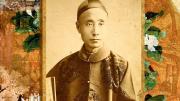Yale was the first American college to offer instruction in Chinese, in 1877; apparently, no one signed up. The next year, a group of Boston and Salem businessmen engaged in the lucrative China trade decided that Harvard, their alma mater, should also offer Chinese, to prepare a generation of young men to assist and succeed them. A Boston newspaper editorialized, “The day is probably coming when the hieroglyphics on tea chests and firecracker boxes will be as intelligible to the average Yankee boy as the signs over the shops of his native village are now.”
China and Harvard were hardly strangers: five alumni were already employed by that nation’s Imperial Maritime Customs Service. Run by an international staff who were required to learn Chinese, the service also managed China’s telegraph and postal systems, handled emigrant labor issues and the payment of indemnities to foreign nations, and often represented the country abroad. The Bostonians even consulted the service’s longtime inspector general, Sir Robert Hart, who advised against the idea, writing, “A Chinese literary man can undertake no more dreadful drudgery than…teaching Chinese to a foreigner….Men who join the Customs have plenty of time after joining to acquire the language….”
The project went forward nevertheless: $8,750 to finance it was raised in China, and Harvard president Charles William Eliot noted that the Corporation had begun planning to raise a subscription as well. Edward Bangs Drew, A.B. 1863, A.M. ’68, the alumnus with the most seniority in the customs service, was asked to find a suitable candidate and recommended Ko K’un-hua, with whom he had studied briefly. Ko had spent five years working for the British embassy and two more at the American consulate in Shanghai, but did not speak English. In a confidential letter to Eliot after Ko had been selected, Drew did reveal some concerns that apparently were not generally acknowledged. Ko, he wrote, was very learned, but not a recognized scholar, not having obtained any degrees by examination; he had purchased his official title. (The impecunious Chinese government frequently sold titles that granted some social status and the right to wear certain garb ordinarily reserved for scholars and officials.)
Drew also revealed that Ko was suspected of having published a critical essay about local officials, who were threatening prosecution. Eliot subsequently, if not consequently, telegraphed to cancel the agreement, but it was too late: Ko had already quit his job, rented his house, and prepared his family for the journey; he would lose face if the agreement were canceled. Furthermore, Sir Robert Hart had been asked to accept three more alumni into the customs service, presumably in return for Harvard’s taking Ko.
Ko reached Boston with his wife and children in the fall of 1879. The books he brought were Harvard’s first in any Asian language: seeds that grew into the Harvard-Yenching Library’s current million-volume East Asian collection, the largest in any academic library outside Asia. He informed Drew of his safe arrival in a letter (now in the library’s archive) written in the formal style and elegant calligraphy expected of a Chinese scholar. Yet uncertainty about his position remained. Only two days after his arrival, an unidentified faculty member reportedly said, “Who is going to learn Chinese, and how it is to be got into our College, are questions that have not even been considered.” That first year, indeed, Ko had only one student: Pope professor of Latin George Martin Lane, A.B. 1846, who taught him English in return. Ko used poems that he wrote himself to instruct “Liu En,” relying on his teenage son, who had studied English in China, to copy and translate them.
The few remaining photographs of Ko reveal a dignified middle-aged man in the long, high-necked, heavy garments of a scholar-official of the Qing dynasty. His embroidered robes would have been nearly unbearable in a Boston summer, but Ko did not experience many of those: a few months before the end of his three-year contract, he died of pneumonia. (Harvard paid for his family’s return to China, and Edward Drew raised funds to educate his sons.)
Eulogies remarked on Ko’s gregarious nature, gentlemanly manner and humor, and ability never to forget a face. His success was recorded in an obituary in the Boston Daily Advertiser: “…he has had only four or five pupils; but…the results obtained have been most satisfactory...[O]ne who has studied with him…has acquired the ability to converse easily with Mandarins, and is nearly ready to establish himself in some business in China.”
At the Harvard memorial service, with Ko’s students, numerous faculty members, and President Eliot among the mourners, the dean of the Divinity School said Ko had brought to the streets of Cambridge “Oriental color...Oriental splendor...Oriental repose.” Ko “was a stranger in the fullest sense of this word....The most common facts...that enter into all our common life, were totally unknown to him...[but we] realized that he had a history and civilization behind him; that when we met him it would have to be on more equal terms than we had dreamed.” Ko’s mandarin’s hat—surmounted by the jeweled button denoting high civil rank—lay atop the coffin. Thus ended Harvard’s initial endeavor to teach Chinese. It would be almost four decades before the language was restored to the University’s curriculum.
Raymond Lum, Ph.D. ’85, is librarian for Western languages in the Harvard-Yenching Library, Asian bibliographer in Widener Library, and instructor in Chinese in the Harvard Extension School.









